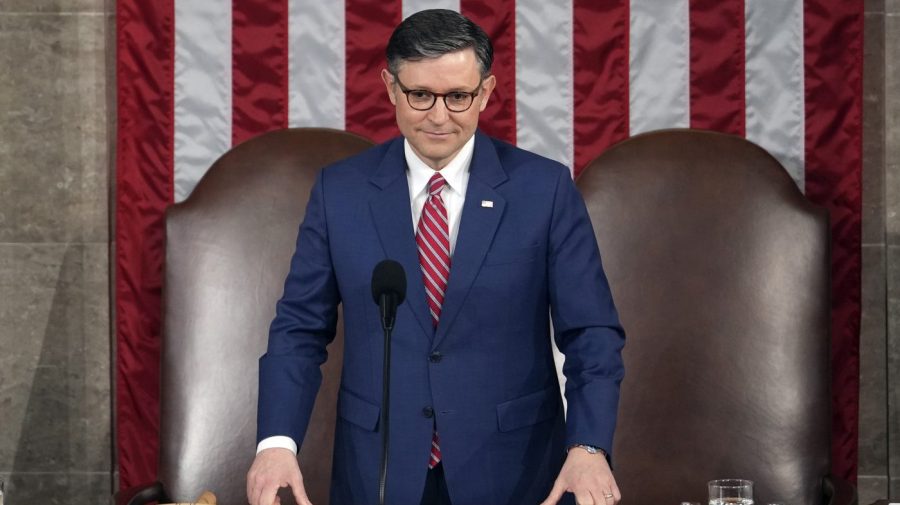
House Republicans reelected Mike Johnson (R-La.) as Speaker on Jan. 2. Conservative firebrands set aside their anger about the last-minute budget deals Johnson cut with Democrats, which averted multiple government shutdowns, to provide the narrow margin of victory.
President-elect Donald Trump’s endorsement certainly played a pivotal role. So did the possibility that the 2025 Republican trifecta — control of the White House, the Senate and the House — will convince the Speaker to implement the priorities of his conservative colleagues. These members were no doubt pleased by Johnson’s recent acknowledgment that Congress had failed to address “the grave threat” deficit spending poses to America’s economic and national security and his vow to “reduce the size and scope of the federal government.”
Given the Republicans’ razor-thin House majority, no one can be certain what the Speaker can and will do in 2025. But in the search for the “real” Mike Johnson, it seems wise to take the advice of Maya Angelou: “When someone shows you who they are, believe them the first time.”
Here are highlights from the record of this little-known yet very powerful politician.
A committed foe of abortion, Johnson claims that if the nation had not given “constitutional cover to the elected killing of unborn children,” and women were producing more babies, slashing entitlement programs might not be necessary.
That said, as chair of the House Republican Study Committee, Johnson proposed massive cuts in the social safety net. He suggested reducing Social Security outlays by $750 billion over 10 years by raising the retirement age to 69, slowing the rate of cost of living increases and eliminating payments to those whose annual income exceeds $85,000 and couples who make $170,000 or more; saving $2 trillion in Medicare by raising the eligibility age to 69 and indexing it to life expectancy, and giving recipients vouchers to buy either private or government plans instead of guaranteed benefits; and cutting funding for Medicaid and the Affordable Care Act by $3 trillion.
Johnson advocates defunding Planned Parenthood. He maintains that the SNAP program (previously known as food stamps) is “our nation’s most broken and bloated welfare system.” And he opposed the PACT Act, which expanded health care benefits for armed services veterans exposed to toxic substances during their military service.
But Johnson is a selective budget hawk. Since he has been in Congress, he has voted for every Defense budget, including this year’s allocation of about $850 billion. He has not demanded studies, for example, of potential savings from a new round of base closings or reducing or eliminating “cost-plus” contracts.
Johnson supports renewing the 2017 Trump tax cuts, a bonanza for wealthy Americans, brushing aside estimates that doing so will add $5.8 trillion to the national debt over the next decade. He claims — without evidence — that deregulation and economic growth will make up the difference. He has also endorsed Trump’s campaign promise to exempt tips from taxes, which would reduce federal government coffers by about $866 billion over 10 years.
According to Johnson, deporting about 4.5 million illegal immigrants with criminal records will be the federal government’s “first priority.” Vice President-elect JD Vance has put the number of those who have committed crimes at 1 million, while Rep. Tony Gonzalez (R-Texas) puts it at about 600,000. And Johnson has expressed no concern about the effect on the economy and the government’s budget deficit — let alone on the lives of millions of people — of investigations, arrests, detentions, deportations and the removal of workers from industries such as manufacturing, hospitality and agriculture.
Johnson voted against the John Lewis Voting Rights Act and the Violence Against Women Act. In 2020, he helped draft a brief for a lawsuit seeking to overturn the results of the presidential election in Pennsylvania, Georgia, Michigan and Wisconsin.
Johnson supports legislation banning any discussion of gender identity, sexual orientation or related subjects in public schools. He has advocated criminalizing gay sex and characterized gay marriage “as the dark harbinger of chaos and sexual anarchy that could doom even the strongest republic.” He opposed extending medical benefits to same-sex partners of federal government employees.
Johnson once stated that “we tamper with God’s created order at our peril,” and as a lawyer, he represented the creationist Noah’s Ark Theme Park Developers in Kentucky in a case involving the state’s denial of tax incentives to its parent company for making belief in the biblical flood a condition of employment. The requirement, Johnson argued, did not violate the separation of church and state; the denial of tax incentives constituted “viewpoint discrimination.”
The recipient of more campaign funds from oil and gas companies than from any other industry, Johnson has opined that fossil fuels are not the “primary driver” of climate change, voted to cut funding from the Environmental Protection Agency and declared that the Democrats’ Green New Deal “would usher in a socialist society in America.”
Since so many House seats are now in safe districts, where the principal threat to incumbents is a primary election, members are now much more likely to be ideologues, contemptuous of compromises. In contrast, when a Speaker’s party holds a slim majority, he or she must be a pragmatist to get anything done.
In 2023 and 2024, Mike Johnson tried — and failed — to square that circle. This time he may be tempted or even compelled to choose “apocalypse now.”
Glenn C. Altschuler is the Thomas and Dorothy Litwin Emeritus Professor of American Studies at Cornell University.

